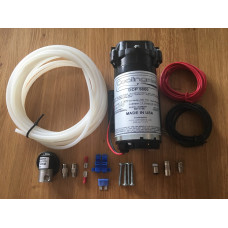This kit is designed for the user who wishes to control their water meth from their standalone ecu and not use one of our boost switches or progressive controllers.
It still offers the option of a failsafe as well to work with the ecu for meth dependant mapping, either a pressure switch for a digital input or a 0-5v signal.
For those wanting to use a Fast acting valve there is that upgrade option also.
Kit Contents
- 200psi pump
- 20ft of High Pressure Tubing
- Injector (please supply engine cc & max boost + rpm so we can supply appropriate sizes).
- Nozzle Holder
- 300psi solenoid
- tank tap
- All fittings needed for installation
- Inline Fuse Holder with 10 amp fuse
- 10' of red and black wire
- Zip ties and wire splices and connectors
Water/Methanol injection for your forced induction project is the perfect way to greatly reduce intake air temperatures while increasing fuel octane levels. This advantage will allow for safe tuning of higher boost levels and more aggressive ignition tuning, without the cost of race fuels!
WATER/METHANOL INJECTION ADVANTAGES:
Reduces Air Inlet Charge Temps
The term “liquid intercooling” with water/methanol injection refers to a highly atomised mist of water/methanol that is injected into the air stream and begins to evaporate. As it does, this evaporation effect reduces air charge temps by as much as 100 degrees, and delivers a more oxygen-rich air charge.
Reduces Detonation (Knock)
Water absorbs heat (6x more than fuel), and methanol is a cool burning, anti-knock rated fuel. When combined and introduced into the inlet stream, they can effectively increase your vehicle’s anti-knock index so you can reliably increase boost pressure and advance ignition timing using pump fuel.
Reduces Carbon Deposits
Modern vehicles fitted with Exhaust Gas Re circulation (EGR) devices for emissions control promote heavy carbon build up inside the air intake. This carbon build-up can create ‘hot spots’ in the combustion chambers that can cause detonation. Water/methanol injection has a ‘steam cleaning’ effect that reduces this carbon build up, and in some cases can increase fuel economy.
Tuner kit
- Product Code: tunerkit
- Availability: In Stock
-
£283.29
Available Options
Related Products
Coolmist Cocktail
Coolmist Cocktail is Coolingmist's mix of 50% methanol (99.9% Virgin grade) and 50% Distilled water ..
£37.29
11/32 Drill bit
These drill bits are perfect for using to drill the hole required for taping ready for the nozzle, ..
£4.79
4 Cylinder Direct port kit
Our 4 Cylinder direct port upgrade gives all the fittings needed to upgrade your kit to the benefits..
£145.79
Race Injector
The Race Injector ( female 1/8npt) offers unbeatable water/methanol injection CONTROL and most eleg..
£120.79
FrostByte V3 3D Methanol Injection Controller
Upgrade your methanol system or build your own. With fuel table-like control of methanol flow, this ..
£383.33
0-300psi linear pressure sensor
A pressure sensor can provide a great alternative to water/methanol flow sensors for budget applica..
£49.96
4 Cyl RACE Direct port
Direct port distributes spray evenly. However, putting mist at the backs of those intake valves ON T..
£383.29
6 Cyl RACE Direct port
Direct port distributes spray evenly. However, putting mist at the backs of those intake valves ON T..
£574.96
8 Cyl RACE Direct port
Direct port distributes spray evenly. However, putting mist at the backs of those intake valves ON T..
£774.96
Tags: tuner, ecu, coolingmist, water, injection, methanol, kit, JB4, BMS, N54, N55, B58, F10, S55,







-80x80.jpg)





